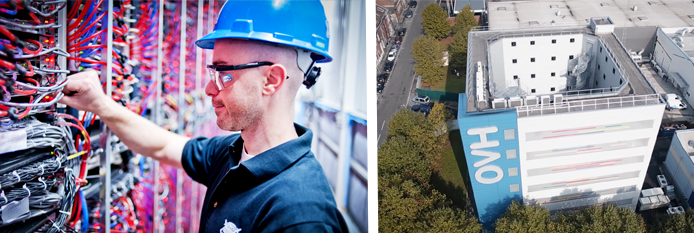
TL; DR: Started nearly 20 years ago in Roubaix, France, with fewer than a dozen servers, OVH has grown into the third-largest hosting provider in the world. Today, OVH boasts 300,000 servers in 27 datacenters across eight countries. The company’s infrastructure system provides high performance, global security, and affordability to more than 1 million SMBs and enterprise-level businesses worldwide. And, with an expanded footprint into new US markets, OVH is sure to continue to deliver need-based hybrid, private, and public cloud solutions to the high-growth technology organizations that are powering the modern business landscape.
When 24-year-old Octave Klaba emerged from his studies at the ICAM School of Engineering in Lille, France, he knew there was a void in the web hosting market and was determined to fill it.
Armed with a small loan from family and friends and 10 servers rented from Paris, Octave founded hosting company OVH in Roubaix, France. While the idea itself wasn’t unheard of — it was 1999, and entrepreneurs worldwide were inching their way into the hosting market — Octave’s approach to infrastructure builds and cooling was wildly different.
Instead of shying away from the seemingly insurmountable challenges presented by increasing competition, Octave embraced them as opportunities. As the business grew, he enlisted the assistance of his father, mother, and brother — also mastermind engineers — and, together, the family helped satisfy market demand while creating groundbreaking products and business-focused web solutions in the process.
“Without a doubt, they were doing it because it was their passion,” said Russ Reeder, OVH US’s CEO. “They thought it was a challenge to go build better technology at a better price.”

OVH CEO Russ Reeder told us how the host is helping companies — large and small — build out their IT infrastructure.
That passion paid off, and the company grew exponentially. OVH is now the third-largest hosting company in the world, running 300,000 servers in 27 datacenters, and powering upward of 18 million web applications.
With a reinvented infrastructure system bolstered by global security, OVH delivers need-based hybrid, private, and public cloud solutions to more than 1 million customers around the world. And the company is continuing to scale with expanding footprints in today’s fast-growing tech markets.
A Reinvented Infrastructure Backed by Global Security
OVH’s tagline, “Innovation is Freedom,” is truly a reflection of the company’s 18-year journey.
“As they saw problems — as a family of engineers would do — they knocked them down, creating solutions that were better, faster, and less expensive,” Russ said.
In 2002, for example, when the company’s early growth prompted the need for more servers, OVH designed and built its own: the GreenBox. It has continued to design and build its own servers, racks, and hosting towers ever since, which enables the company to ensure quality standards are met from the production level through delivery.
A year later, OVH acquired its first datacenter in a residential area of Paris where servers could not be cooled by traditional air conditioning because of noise restrictions. To overcome this problem, the company turned to a revolutionary water-cooling approach. By 2004, the company had developed a water-cooling mechanism for servers that is quieter and reduces energy consumption by a third compared to air conditioning.
The system is now used in all of OVH’s datacenters.
“Obviously, water cooling was not new — mainframe and gaming computers use it,” Russ said. “But it’s definitely unique now that we have 270,000 servers that are cooled this way.”

More than 1 million customers worldwide employ OVH’s high-performance infrastructure system.
But the R&D didn’t stop with servers. Seeking to further reduce energy consumption, the company developed in-house cooling systems that completely eliminated the need for air conditioning in the datacenters. Since 2010, all new datacenters feature this environmentally friendly system.
“That enabled 30% to 50% cost savings,” Russ said.
As is the case with many of OVH’s innovations, those savings are passed on to clients, creating a cost structure that is hard to beat. The company also designs and operates its own global fiber-optic network.
“We have thousands of miles of dark fiber that we own, wrapped around the US, around EMEA (Europe, the Middle East, and Africa), and around the world,” Russ said.
With 12 Tbps network capacity globally, OVH is able to guarantee faster speeds; bandwidths of 100 Mbps, 200 Mbps, and 300 Mbps; and low latency. And these features are all backed by protection against DDoS attacks.
“We have more than 3TB of DDoS capacity on a 12-terabyte network,” Russ said. “It’s unheard of, especially for the cost structure that we have.”
Delivering Need-Based Hybrid, Private, and Public Cloud Solutions
Russ told us today’s cloud is akin to a basic utility, such as electric, gas, or water, that one would receive from a provider.
“Just think — you used to have to heat your house through a fireplace,” he said. “Now, it’s silly not to have your heat or gas coming through a utility. Today, we’re living the vision that the cloud really is a utility. More people are realizing there is no way they can do it better themselves.”
And OVH’s innovative nature has placed it in the best position to offer such a utility.
“Our unique factor — what we really do well — is that we’ve totally reinvented the entire cloud hosting technology stack,” Russ said.
The company offers four basic solutions: a cost-effective virtual private server (VPS); dedicated servers that guarantee high performance for heavy users; the guaranteed resources of the public cloud; and the flexibility of the private cloud powered by VMware. All solutions free users from dealing with infrastructure management, as all hardware is maintained by OVH.
OVH also offers hybrid cloud solutions that allow the customer to mix and match products as needed through technology such as vRack. In addition, vRack Connect allows users to securely connect their business network to a private OVH network.
OVH Leverages VMware’s Hybrid Cloud Technology with vCloud® Air™
As a longtime cloud provider, OVH has worked closely with VMware, which has recognized the host as Service Provider of the Year on multiple occasions.
“We were one of the first ones to take vSphere to the private cloud on the infrastructure side,” Russ said. “We are a market leader and have been VMware’s global #1 partner for seven years.”
Russ told us that roughly five years ago, VMWare approached OVH with the intent of forming a tighter partnership.
“OVH said, ‘OK, we’re just going to be a reseller — we don’t want to be married to anyone specifically,’” Russ said. “That’s when VMware created vCloud® Air™ to create a hosted version of VMware.”
In July, OVH acquired the EMEA portion of VMware vCloud® Air™, having already onboarded the US portion in May.
It’s OVH’s goal, in both the US and EMEA, to leverage the hybrid cloud technology provided by VMware and vCloud® Air™ for disaster recovery and datacenter extension and replacement.
An Expanded Footprint Built Around High-Growth Technology Markets
According to Russ, OVH’s acquisition of the vCloud® Air™ business in the US helped accelerate the company’s rapid growth in North America.
“We were able to advance the OVH plan in the US by about three to four years with one acquisition,” Russ said. “This was an amazing opportunity for us because, especially in acquisitions, you want to make sure it’s a strategic tie-in.”
The company’s recent addition of office space in Reston, Virginia, has furthered that growth. With 20,000 square feet of new workspace, the company will bring approximately 100 jobs to the region, with further expansion to come.
Russ told us OVH is building out two datacenters in Virginia and Oregon. The East Coast datacenter will be operational in fall 2017, with the West Coast launch coming in Q1 2018.
“I’m super excited about the launch,” Russ said. “We have an amazing team with great technology that I think will really disrupt the US market.”
HostingAdvice.com is a free online resource that offers valuable content and comparison services to users. To keep this resource 100% free, we receive compensation from many of the offers listed on the site. Along with key review factors, this compensation may impact how and where products appear across the site (including, for example, the order in which they appear). HostingAdvice.com does not include the entire universe of available offers. Editorial opinions expressed on the site are strictly our own and are not provided, endorsed, or approved by advertisers.
Our site is committed to publishing independent, accurate content guided by strict editorial guidelines. Before articles and reviews are published on our site, they undergo a thorough review process performed by a team of independent editors and subject-matter experts to ensure the content’s accuracy, timeliness, and impartiality. Our editorial team is separate and independent of our site’s advertisers, and the opinions they express on our site are their own. To read more about our team members and their editorial backgrounds, please visit our site’s About page.

